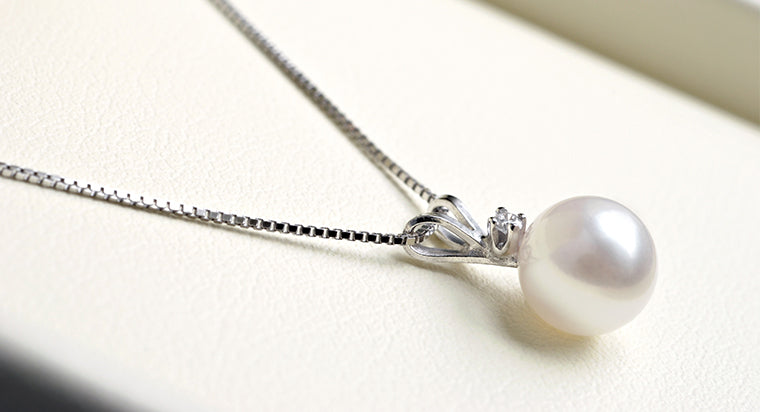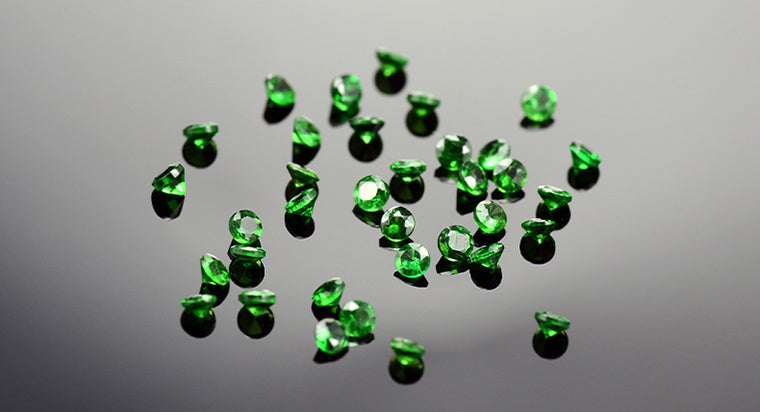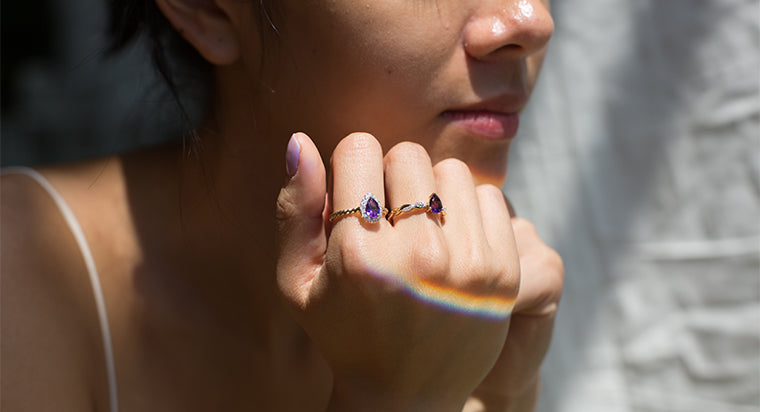Pink Tourmaline Gemstone Guide
Tourmaline can come in many colors, one of the prettiest being pink! Pink tourmaline can be found in many shades, from pale to vivid. Tourmaline comes from the Sinhalese word "toramalli," which means stone mixed with colors. Pink tourmaline crystal has been around for centuries, but for ages was confused with other reddish gems like rubies. In fact, one of the pendants in the iconic Romanov jewels is set with a 250-carat pink tourmaline initially thought to be a ruby! In the early 1800s, it was officially introduced as its own mineral species.
Since then, it has risen in popularity. October claims the pink tourmaline birthstone, and wedding couples celebrating their eighth wedding anniversary may also seek a pink tourmaline gift. Traditionally, this gem was believed to promote emotional wellbeing and was associated with matters of the heart. Thankfully, it's one of the hardest gemstones you can wear, making it suitable for everything from a pink tourmaline pendant to a pink tourmaline and diamond engagement ring. Wearers of pink tourmaline jewelry love the stone for its rosy hue and ability to add femininity to any outfit!
TABLE OF CONTENTS
Pink Tourmaline Shapes
Pink tourmaline comes in different forms, from long and thin crystals to thick and grouped closely together. Additionally, the gem can be transparent or opaque and comes in many different shades. Therefore, it is common to see just as wide of a variety of shapes, with emerald or baguette being the most common.
Long cuts, like the baguette, can closely follow the natural elongated structure of tourmaline and reduce waste. However, you can also find emeralds, rounds, cushions, and ovals. Fancy shapes, like pears and marquises, are less common, although the heart shape lends itself perfectly to pink tourmalines coloring. Finally, pink tourmaline can sometimes possess a cat's eye effect. If this is the case, the cat's eye will be preserved and highlighted with a cabochon shape.
Pink Tourmaline Sizes
Pink tourmaline can be found in a range of sizes. Like other gemstones, it is measured in carats. To boost the stone's color, pink tourmalines may be cut either deep or shallow. A deep-cut tourmaline can appear smaller than a shallow cut to the naked eye, meaning you may want to base your choice on actual size measurements rather than appearance.
Out of all the pink gems, tourmaline is one of the few that can be found in large sizes. However, finding natural pink tourmaline of fine quality can be challenging, and most specimens tend to be smaller. Pink tourmaline rings can look stunning with a large, solitaire gem. In contrast, pink tourmaline bracelets often feature smaller shallow-cut stones.
Pink Tourmaline Colors
From pale to hot pink, there are many shades of pink tourmaline. Some can be so red that they are easily confused with a ruby, and these vivid hues used to be the most popular. Today, color saturation largely determines value.
Pale and soft pink tourmalines are less desirable. Although, over-saturation can turn pink tourmaline opaque and make it equally undesirable. Sometimes other hues will be mixed in, making the gem appear more orange or red. If these color variations have a pattern, the stone can be referred to as a tri-color or bi-color pink tourmaline. While radiant, even-toned, rich pink gemstones seem to be the most preferred in today's market, you can find pink tourmaline in many different shades and tones to suit your tastes.
Pink Tourmaline Clarity
As is typical with other colorized gems, there is no standardized grading system for pink tourmaline. Unfortunately, it is common for pink tourmalines to have some flaws and inclusions, many of which can be visible to the naked eye. This is because liquid is prevalent where tourmalines grow and often gets trapped inside the stone, forming elongated tube-like structures.
The inclusions can be overlooked if the stone is rich and vivid enough in color. The exception is white or gray inclusions that significantly decrease the gem's value. When selecting a pink tourmaline, you should look for a stone whose inclusions and flaws are the least obvious.
Pink Tourmaline Sourcing
Pink tourmaline is not considered rare and can be found worldwide. In the United States, Maine and California were once the world's biggest sources of pink tourmaline. The gemstone was first discovered in the US in the mid to late 1800s. Tiffany & Co lobbied for its debut into the world of colored gemstones as an American gem.
Brazil, Mozambique, Madagascar, Afghanistan, Nigeria, and Namibia have pink tourmaline mines. Brazil's Muzo mines and Namibia tend to produce the most desirable stones. Namibian pink tourmaline tends to be quite vivid and intense with the ideal shade of pink. Pink Tourmaline Certification
Usually, you cannot have a pink tourmaline stone certified. There are several ways to tell if your tourmaline is 100% natural.
Glass remains one of the most popular ways to produce fake gemstones, including tourmaline. If your stone has bubble-like inclusions, it may be glass. Alternatively, if your pink tourmaline gem is crystal clear, it might be synthetic, as natural tourmaline is rarely free of inclusions. Finally, check your tourmaline under artificial light as most genuine pink tourmalines will display a brown undertone and not remain perfectly pink.
Pink Tourmaline Treatments
Pink tourmaline often isn't treated. Some tones may undergo heat treatment to intensify their color, but this isn't overly common. Because pink tourmalines come in so many different shades, there usually isn't a reason to treat them for reasons based on color.
Aside from heat treatment, some stones may undergo irradiation to enhance their color. Heat-treating and irradiation are nearly undetectable, even by labs with certified gemologists.
Pink Tourmaline Buying Guider
When choosing a pink tourmaline, it really is all about color. But, before you get too focused on the shade, consider these factors as well.
Budget First. Of course, it is always wise to set a budget and stay within that range. There are so many options of color, size, and shape when it comes to pink tourmaline that you're almost assured of finding something in your price range.
Select a Shape. Elongated and rectangular or square shapes are the most common for pink tourmaline. But fancy shapes are popular too. Pick one that suits your taste and jewelry design.
Select a Size. Pink tourmaline comes in many sizes, from small carat weights for pink tourmaline earrings to impressive stones for a pink engagement ring.
Quality Above All Else. When selecting a pink tourmaline, go for the quality. Is the color intense and evenly saturated? Are there few to no observable inclusions or flaws? Does the cut bring out the radiance of the stone?
In-Store or Online? While either option is suitable for purchasing pink tourmaline, online can offer a greater selection. Though you won't be able to view the stone in person, most online options provide clear photos and precise measurements. Just be sure to check their return policy and reviews to make sure they're reputable!
FAQs
What does the pink tourmaline symbolize?
Which metal best suits a pink tourmaline?
Can I wear pink tourmaline every day?
Does pink tourmaline fade with time?










